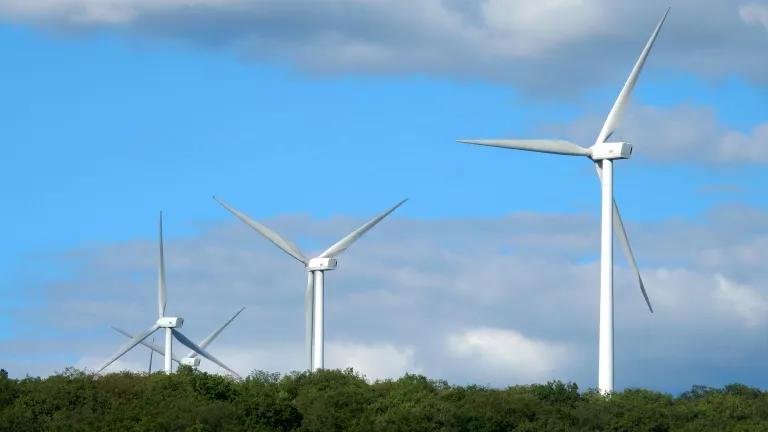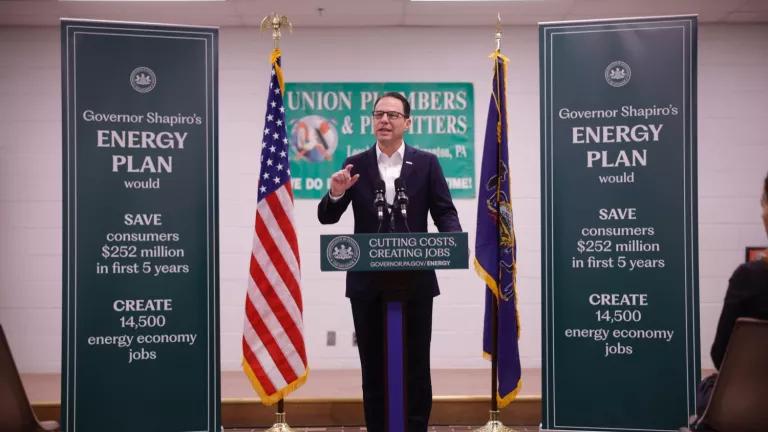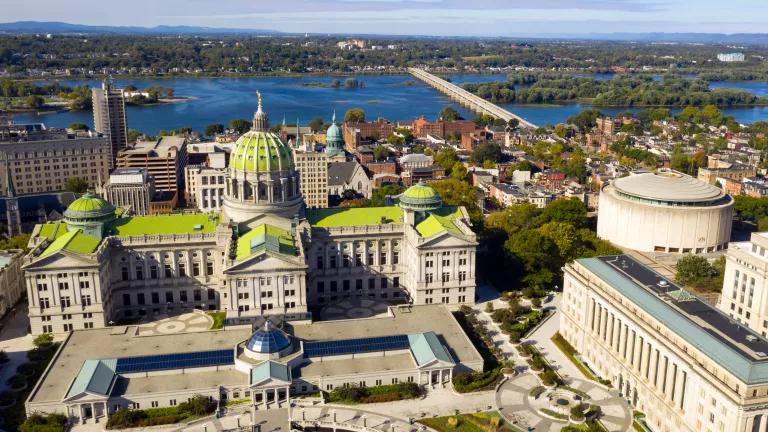RGGI Is PA's Path Forward on Climate in 2023
The task now is to defend the regulation in court and, critically, implement an equitable investment plan that fully realizes RGGI’s promises for Pennsylvania.
For Pennsylvania's quest to participate in the Regional Greenhouse Gas Initiative (RGGI), 2022 was a year of progress, if not without setbacks. 2023 will be the year the Commonwealth actually starts to participate, assuming that: (1) the Department of Environmental Protection's RGGI regulation is upheld in court, and (2) Governor-elect Josh Shapiro leans into his mandate to implement the regulation.
NRDC is confident of both outcomes.
Meanwhile, this blog recaps the key events that affected the RGGI regulation in 2022. And in anticipation of the Shapiro administration’s likely establishing a RGGI working group in 2023, it collects NRDC blogs about RGGI on some key issues, including climate change, public health, electricity bills, and jobs and economic development.

Jessica Russo/NRDC
What Happened in 2022
The one-paragraph version of the 2022 RGGI saga is that on April 23, more than two and 1/2 years after Governor Wolf directed the DEP to propose a regulatory rulemaking to cut climate pollution from power plants, the DEP's RGGI regulation (formally known as the CO2 Budget Trading Program) was published in the Pennsylvania Bulletin and became law. Then lawsuits were filed, and in July the Pennsylvania Commonwealth Court issued a preliminary injunction delaying enforcement of the regulation until the legal claims are decided. As a result, although Pennsylvania is technically now a RGGI-participating state, it has yet to participate in any RGGI auctions – and so has missed out on hundreds of millions of dollars of RGGI auction proceeds to invest in things like bill-lowering energy efficiency and clean energy job creation – and on the substantial public health benefits those investments create.
The lawsuits followed years of efforts by fossil-fuel-aligned state legislators to prevent the DEP from finishing the regulation. This obstruction first took the form of legislation in both the 2019-20 and 21-22 legislative sessions, then of "resolutions of disapproval" under the Pennsylvania Regulatory Review Act (RRA). All of the bills and resolutions that passed were vetoed by Governor Wolf, and the General Assembly never managed to override a veto. They did, however, delay publication for months, thereby ensuring that the regulation would still be in court at the time of the November, 2022 gubernatorial election.
The legislators' final delay tactic was to claim that the RRA – which provides the legislature with a time-limited opportunity to adopt a resolution disapproving a regulation and prevents the regulation from being finalized during that period – gave them much more time to act than the law provides. The Legislative Reference Bureau (LRB), which publishes the Bulletin, refused to publish the RGGI regulation on this basis and in February 2022 the DEP sued the LRB to compel publication. Then anti-RGGI legislators intervened in that case and filed a substantive challenge to the unpublished regulation as a counterclaim. Two more challenges were filed after publication finally occurred, one led by companies with interests in two of Pennsylvania's three remaining conventional coal plants and another by companies with interests in gas-fired power plants.
The preliminary injunction, which the DEP has appealed to the Pennsylvania Supreme Court, was issued to maintain the pre-RGGI-regulation status quo until the claims against the regulation are decided "on the merits." In November, 2022, shortly after the elections, the Commonwealth Court heard argument on the merits. It could issue a decision at any time. Meanwhile, the Supreme Court could decide the injunction appeal at any time, and a reversal would enable Pennsylvania to participate in RGGI pending the Commonwealth Court's merits decision.
Starting on January 17, responsibility for defending the RGGI regulation will pass to the Shapiro administration. During his 2022 gubernatorial campaign, governor-elect Shapiro declined to take a firm position on Pennsylvania's participation in RGGI, instead articulating a three-part test that he would use to evaluate the DEP's RGGI regulation as governor: whether it would "take real action to address climate change, protect and create energy jobs, and ensure Pennsylvania has reliable, affordable and clean power for the long term."
By contrast, Shapiro's opponent Doug Mastriano campaigned on an unambiguous pledge to keep Pennsylvania out of RGGI.
Pennsylvanians chose Shapiro - and his commitment to act on climate - over Mastriano's embrace of fossil fuels. And as the blogs below show, RGGI clearly passes Shapiro's test. Consequently, the Shapiro administration now has a mandate to defend and implement the DEP's RGGI regulation.
NRDC Blogs to Refer to When the RGGI Debate Heats up Again in 2023
After last November's election, Governor-elect Shapiro said that on "Day One" of his administration he'd convene a working group on RGGI. When that group is established, the debate over Pennsylvania's participation is likely to intensify again, along with the dissemination of RGGI disinformation. Here are some blogs to consult when that happens:
- For an overview of what RGGI is, how it works, and what it's accomplished since 2009, see The Regional Greenhouse Gas Initiative is a Model for the Nation. This blog is also available in Spanish.
- RGGI's Record of Success, and What PA Stands to Gain also provides an overview of RGGI's accomplishments, but does so in the context of the DEP's 2020 modeling of the RGGI regulation, which – not surprisingly – projected that participation in RGGI would bring Pennsylvania the same kind of climate, health, and economic benefits as it's delivered to the current RGGI states. The modeling is discussed in more detail in Key Takeaways from PA's New RGGI Analysis, and RGGI’s macroeconomic (i.e., jobs and economic development) record is covered in more detail in RGGI Shows Tackling Climate Change Pays Major Dividends.
- Since Governor-elect Shapiro campaigned on a pledge to update Pennsylvania's Alternative Energy Portfolio Standards Act to include a goal of 30 percent renewable energy by 2030, people have been trying to understand whether the RGGI regulation and an AEPS update would produce similar outcomes. They would not, and that Pennsylvania needs to do both in order both to reduce carbon pollution over the next decade and ensure a build-out of renewables in the long term. This is explained in a 2019 blog, PA Needs CO2 Limits - and Strong Renewable Policy Too, and a 2022 update, Pennsylvania Needs RGGI Now More Than Ever.
- Although Governor-elect Shapiro didn't make health benefits part of his test for the DEP's RGGI regulation, the fact that it would cut health-harming "criteria" pollution from power plants as well as carbon pollution is a big reason for its popularity among Pennsylvanians. There have been two major studies on RGGI's health benefits. The first, released in 2017, is available here; the second, released in 2020, is discussed in New Report Shows RGGI Protects Kids' Health and Saves Money.
- Much of the disinformation spread about RGGI over the last two-plus years concerns its impacts on consumer electricity costs. NRDC has published three blogs that set the record straight. The first, RGGI Lowers Bills, Saving Consumers Billions on Energy, reviews RGGI's historical performance in the current RGGI states. How RGGI lowers energy bills is discussed in Smart RGGI Investments Can Lower Electricity Bills in PA. And Four Facts about Electricity Costs and RGGI in PA breaks down the various factors that contribute to electricity bills in Pennsylvania, and how RGGI allowance costs would be included in wholesale electricity costs.
- As the blog titles above imply, the RGGI states have reduced consumer electricity costs by investing heavily in energy efficiency, as well as renewable energy. This dynamic is discussed in Key Takeaways from RGGI's Latest Investments Report. Pennsylvania legislation (last session's Senate Bill 15) that would invest both in efficiency and in transition assistance for communities where coal plants have closed, is discussed in The PA General Assembly Should Pass the RGGI Investments Act. Similar legislation is expected to be introduced this session.
- Finally, on the subject of coal plant closures, RGGI and Coal in PA - Separating Fact from Fiction breaks down why coal-fired power plants have been closing at a rapid clip in Pennsylvania over the last decade. In short, it's because after the fracking boom started, investors built thousands of megawatts of new, highly efficient gas power plants that have out-competed the coal plants and forced them into economic retirement. To date, the Pennsylvania General Assembly has done nothing to address the impacts of these plant closures. RGGI participation would provide funds to help them do that.
Let’s Get to Work
The Shapiro team has hit the ground running, assembling an impressive staff to lead its policy efforts. They have their work cut out of them – the challenges facing the Commonwealth are many. But in the case of the RGGI regulation, much of the work has already been done. The task now is to defend the regulation in court and, critically, implement an equitable investment plan that fully realizes RGGI’s promises for Pennsylvania. We look forward to working with the administration, other stakeholders, and the General Assembly to help achieve this goal.




